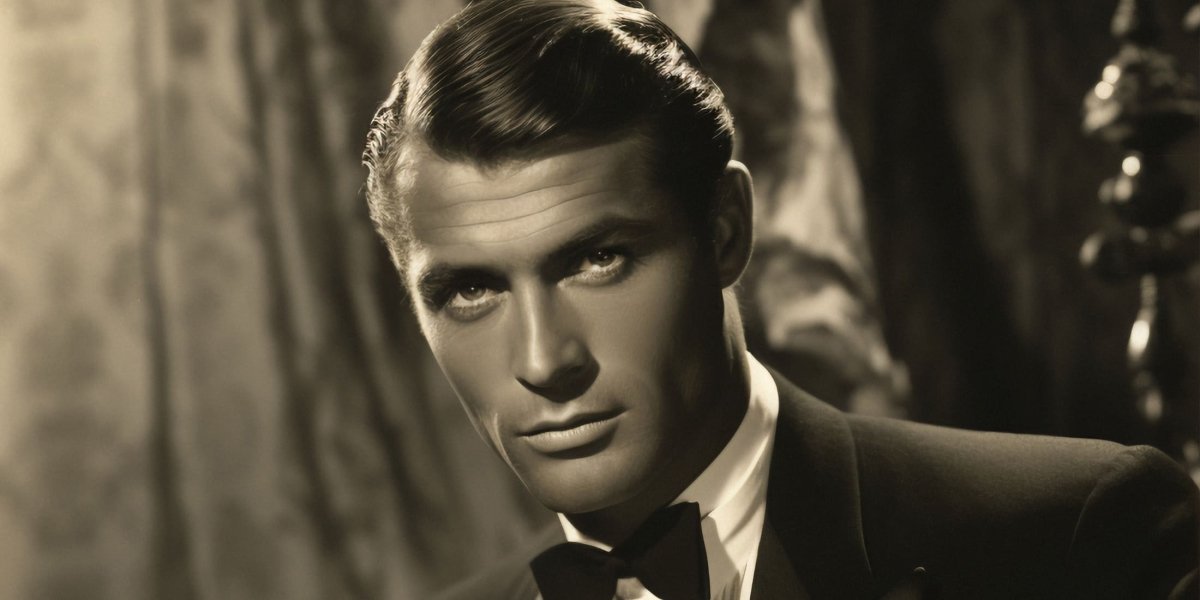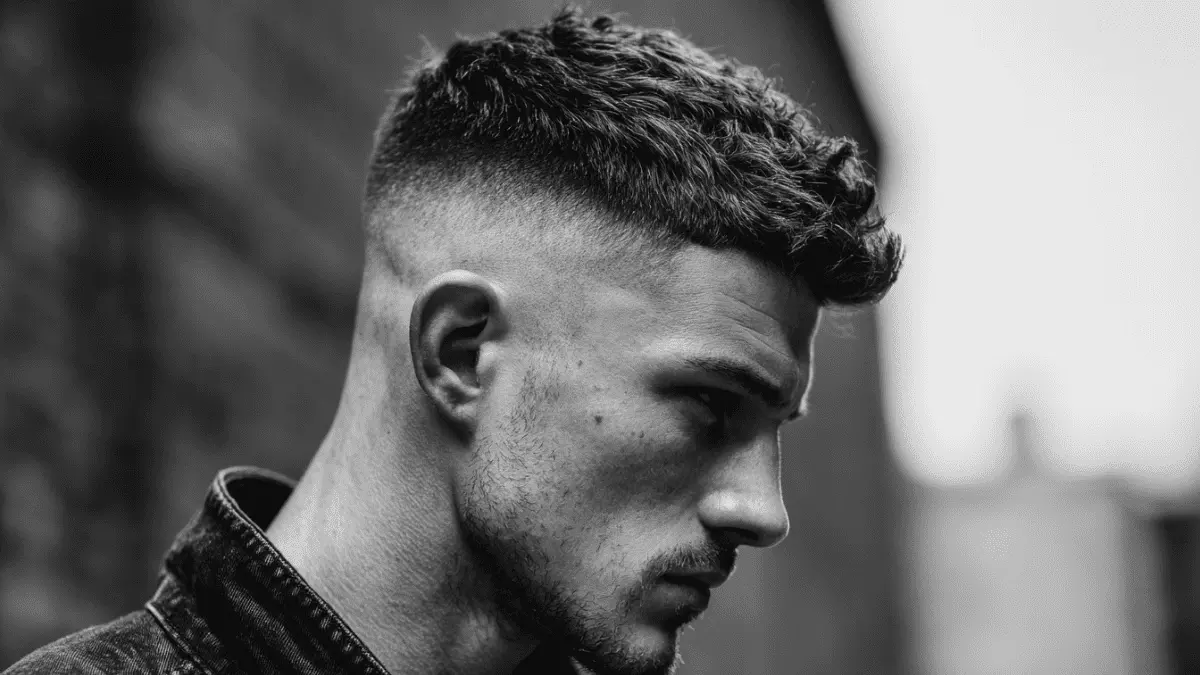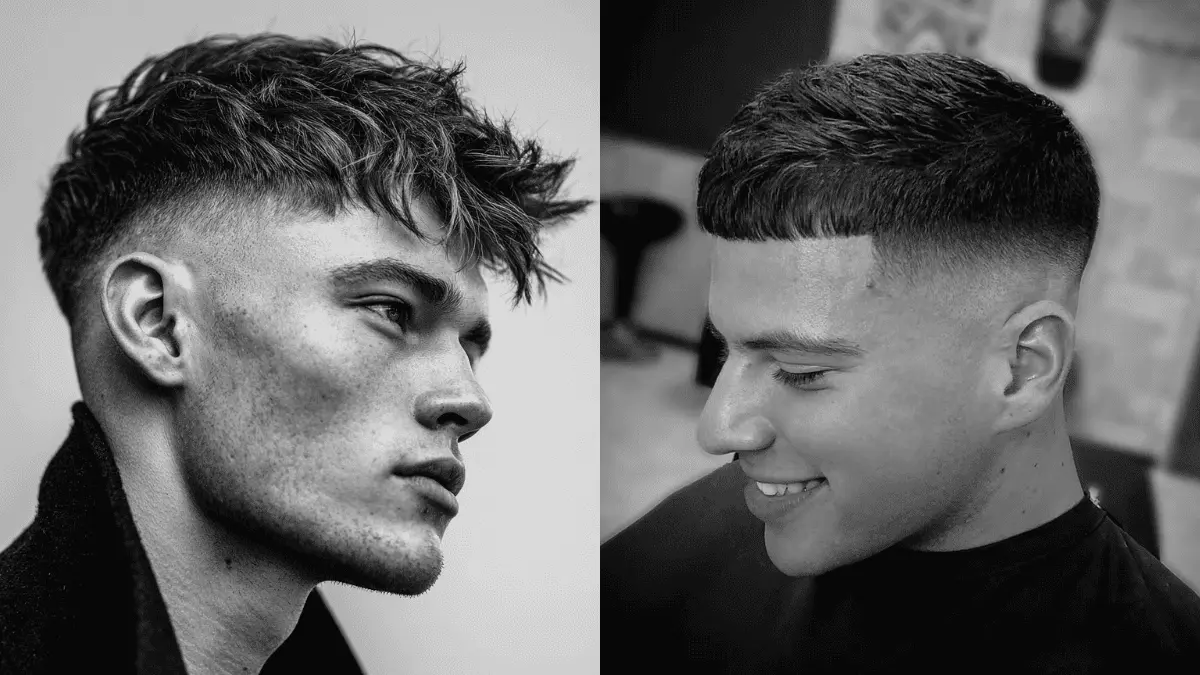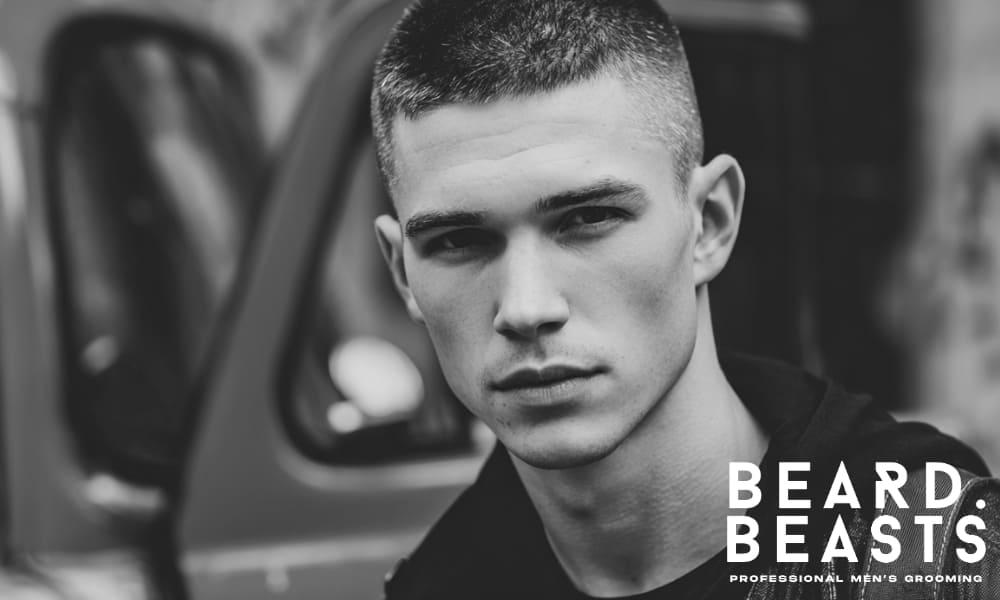Are you fascinated by the timeless elegance of the 1940s men’s haircut and wondering how to incorporate these classic styles into your modern look? The 1940s were an era of distinct fashion, marked by the influence of Hollywood icons and military precision.
From the smooth slicked-back style to the dramatic pompadour, and the practical crew cut to the classic side part and bold flat top, these haircuts have made a significant mark on men’s grooming history. In this guide, we’ll explore the cultural significance, styling tips, and maintenance tricks to help you master these iconic looks in 2025.
Historical Context of 1940s Men’s Hairstyles
The 1940s were a fascinating decade for men’s fashion and grooming. World War II had a significant impact on everyday life, including how men styled their hair. 1940s men’s haircuts were influenced by practicality, military standards, and a desire for a neat, polished appearance. Let’s dive into the cultural and social influences, key features, and famous personalities that defined the hair trends of this iconic era.
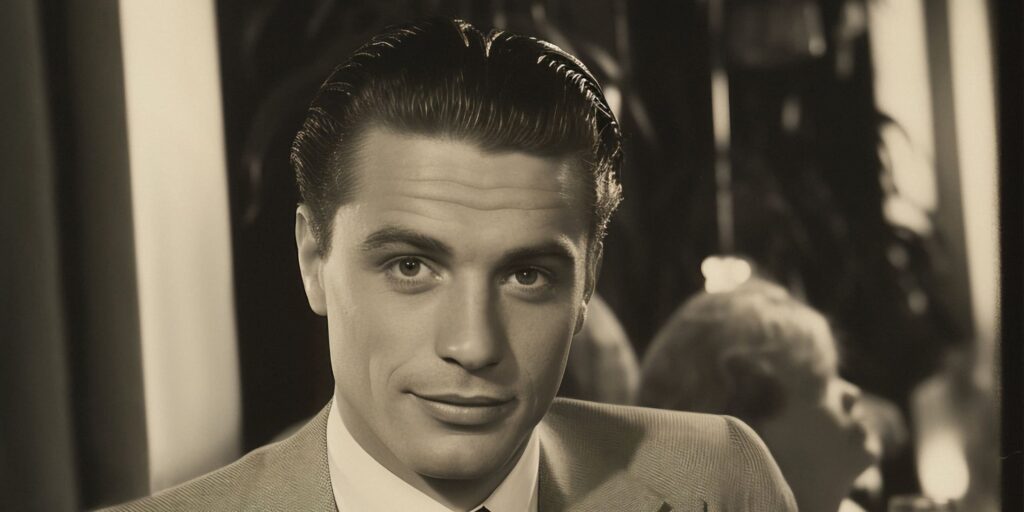
Cultural and Social Influences on Men’s Fashion in the 1940s
Military Influence:
- The war led to practical, short styles as many men were in the armed forces.
- Haircuts like the crew cut and flat top were popular for their easy maintenance and regulation compliance.
Hollywood Glamour:
- Movies and film stars had a huge influence on fashion and grooming.
- Men aspired to look like their favorite actors, adopting similar hairstyles.
Post-War Prosperity:
- After the war, there was a shift towards more relaxed and stylish looks.
- The emphasis was on grooming and presenting a well-kept appearance in both professional and social settings.
Technological Advancements:
- New grooming products and tools became available, making it easier to achieve various hairstyles.
Key Features of 1940s Hairstyles
1. Short and Clean Cuts:
- Crew Cuts: Practical and easy to maintain, reflecting the military influence.
- Flat Tops: Characterized by a flat, level top, often seen in military personnel.
2. Sleek and Polished:
- Slicked-Back Hair: Achieved with pomade or gel, creating a shiny, smooth finish.
- Side Parts: A sharp, defined parting for a clean and sophisticated look.
3. Voluminous Styles:
- Pompadours: High volume at the front, with hair swept upwards and back.
- Wave Styles: Soft waves for a natural yet groomed appearance.
Famous Personalities and Their Iconic Haircuts
Clark Gable:
- Known for his slicked-back hair, Gable’s style was the epitome of 1940s sophistication.
James Stewart:
- Often sported a side part that added to his charming and gentlemanly image.
Humphrey Bogart:
- His short and neat haircuts were perfect for his tough-guy roles, yet stylish for the era.
Frank Sinatra:
- The crooner popularized the pompadour, adding a bit of flair and volume to the typical men’s haircut of the time.
John Wayne:
- Favored a crew cut, reflecting his rugged, all-American persona.
Fun Fact: Did you know that many men in the 1940s used brilliantine to achieve that signature shiny finish? It was the go-to product for a sleek, polished look.
By understanding the cultural and social influences, key features, and famous personalities of the 1940s, we can appreciate why these 1940s men’s haircuts are making a comeback. These styles are not only timeless but also adaptable to modern tastes, blending vintage charm with contemporary flair.
Popular 1940s Men’s Haircuts
In the 1940s, men’s haircuts were a blend of practicality and style. Let’s explore some of the most iconic haircuts of the era and see how they have evolved over time.
The Slicked-Back
Description and Historical Significance: The slicked-back hairstyle was all about achieving a smooth, polished look. Men would use pomade or brilliantine to create a glossy finish, combing their hair back for a neat and sophisticated appearance. This style was perfect for formal events and everyday wear, making it a staple of 1940s men’s fashion.
Modern Adaptations: Today, the slicked-back look has seen a resurgence, especially in business and formal settings. Modern styling products like water-based pomades offer a more natural finish and easier washout.
Tips for a Modern Slicked-Back Style:
- Start with damp hair.
- Apply a medium-hold pomade evenly.
- Use a fine-tooth comb to sweep hair back from the forehead.
- Finish with a bit of hairspray for extra hold.
The Pompadour
Evolution from the 1940s to Present Day: The pompadour in the 1940s was characterized by voluminous hair swept upwards and back. This style was dramatic and required significant effort to maintain. Over the decades, the pompadour has evolved, with variations like the rockabilly pompadour in the 1950s and more textured, relaxed versions today.
Celebrities Who Popularized the Pompadour:
- Elvis Presley brought the pompadour to the forefront in the 1950s.
- Bruno Mars and David Beckham are modern icons known for their stylish takes on the pompadour.
How to Style a Modern Pompadour:
- Blow-dry your hair upwards for volume.
- Apply a high-hold pomade or styling cream.
- Use a round brush to shape the front.
- Set with hairspray for lasting hold.
The Crew Cut
Military Influence and Its Practicality: The crew cut was popularized by military men during World War II. It was practical, easy to maintain, and adhered to military grooming standards. The crew cut involves short hair on the sides and back with a slightly longer top.
Variations and Contemporary Relevance: Modern variations include the high and tight and the textured crew cut, offering a bit more versatility while maintaining the classic, clean look.
Styling a Contemporary Crew Cut:
- Ask your barber for a faded or tapered crew cut.
- Use a light styling product for a natural finish.
- Maintain with regular trims every 3-4 weeks.
The Side Part
Classic Elegance and Its Timeless Appeal: The side part is perhaps the most timeless of 1940s men’s haircuts. It exudes sophistication and is suitable for both casual and formal settings. The key is a well-defined parting line, usually achieved with a comb.
How to Achieve the Perfect Side Part Today:
- Start with damp hair.
- Comb your hair to find the natural parting line.
- Apply a light pomade for hold and shine.
- Comb through to define the part and smooth the hair.
Fun Fact: The side part has been a favorite of many U.S. Presidents, including Ronald Reagan and John F. Kennedy, highlighting its enduring appeal.
The Flat Top
Definition and Rise in Popularity: The flat top is a striking style where the hair is cut to stand upright, forming a flat plane on top. This look became popular among military men and later found its way into civilian fashion.
Styling Tips for a Modern Flat Top:
- Visit a skilled barber who can achieve the precise flat shape.
- Use a strong-hold gel or mousse.
- Blow-dry hair upwards using a comb to maintain the shape.
- Trim regularly to keep the flat top looking sharp.
These 1940s men’s haircuts continue to influence modern styles, blending vintage charm with contemporary trends. Whether you’re looking to channel the sleek sophistication of the slicked-back or the bold structure of the flat top, there’s a timeless style for everyone.
How to Style 1940s Haircuts in 2024
Bringing the charm of 1940s men’s haircuts into the modern era is easier than you might think. With the right tools, products, and techniques, you can achieve these timeless styles with a contemporary twist. Here’s your go-to guide for styling these classic haircuts in 2024.
Essential Tools and Products Needed
- Clippers: For precise cuts, especially for crew cuts and flat tops.
- Combs: A fine-tooth comb for slicked-back and side part styles.
- Blow Dryer: Essential for creating volume in pompadours.
- Pomade: Choose a water-based pomade for a shiny finish and easy washout.
- Hair Gel or Mousse: For strong hold and structure, ideal for flat tops.
- Hairspray: To set styles and maintain hold throughout the day.
- Brushes: A round brush for volume and a flat brush for smoothing.
Step-by-Step Styling Guides
Slicked-Back: Creating the Smooth, Shiny Look
- Start with clean, damp hair.
- Apply a generous amount of water-based pomade evenly through your hair.
- Use a fine-tooth comb to slick your hair back from your forehead to the nape of your neck.
- Smooth out any bumps or waves by combing through several times.
- Finish with a light mist of hairspray to maintain the sleek, glossy finish.
Pompadour: Achieving Height and Volume
- Wash and towel-dry your hair until it’s slightly damp.
- Apply a high-hold pomade or styling cream, focusing on the roots at the front.
- Blow-dry your hair upwards and backwards using a round brush to create volume.
- Shape the front section into the classic pompadour by sweeping it upwards and back.
- Set the style with hairspray to ensure it holds throughout the day.
Crew Cut: Maintaining Sharpness and Precision
- Use clippers with a guard length suitable for your desired length (typically #1 or #2).
- Clip the sides and back uniformly, moving against the direction of hair growth.
- Trim the top slightly longer than the sides, blending the lengths seamlessly.
- Apply a small amount of styling cream to add texture and keep the hair in place.
- Visit your barber regularly (every 3-4 weeks) to maintain the clean, sharp look.
Side Part: Techniques for a Clean, Defined Part
- Dampen your hair with a spray bottle or by running it under water.
- Find your natural part by combing your hair back and letting it fall into place.
- Apply a light pomade to your hair, focusing on the parting area.
- Use a comb to define the part, then smooth down each side for a clean look.
- Finish with hairspray to keep the part in place and prevent stray hairs.
Flat Top: Tips for a Structured, Elevated Style
- Start with dry hair for the best results.
- Use clippers to trim the sides and back, leaving the top longer.
- Shape the top section by using clippers with a flat guard, cutting the hair to form a level plane.
- Apply a strong-hold gel or mousse to the top section.
- Blow-dry upwards while combing to maintain the flat shape.
- Regular trims are crucial to keep the flat top looking sharp and structured.
These steps and tips will help you master the art of 1940s men’s haircuts in 2024, ensuring you look stylish and polished with a touch of vintage charm. Enjoy experimenting with these classic styles and make them your own!
Maintaining Your Vintage-Inspired Hairstyle
Achieving the perfect 1940s men’s haircut is just the beginning. To keep your style looking sharp and polished, regular grooming and maintenance are essential. Here’s how you can maintain your vintage-inspired look with ease.
Regular Grooming and Maintenance Tips
Daily Care:
- Comb your hair daily to keep it neat and prevent tangles.
- Apply a light pomade or styling product to maintain the shape and hold.
- Wash your hair regularly to remove product buildup and keep your scalp healthy.
Weekly Routine:
- Deep condition once a week to keep your hair hydrated and healthy.
- Exfoliate your scalp to remove dead skin cells and promote hair growth.
Monthly Maintenance:
- Trim your hair every 3-4 weeks to maintain the shape and prevent split ends.
- Evaluate your styling products and adjust as needed for changes in hair texture or length.
| Task | Frequency |
|---|---|
| Daily combing | Daily |
| Applying styling product | Daily |
| Hair washing | Every 2-3 days |
| Deep conditioning | Weekly |
| Scalp exfoliation | Weekly |
| Hair trimming | Every 3-4 weeks |
Recommended Hair Care Products
To keep your 1940s men’s haircut looking its best, investing in quality hair care products is crucial. Here are some recommendations:
Pomade:
- Water-based pomade for a shiny, sleek finish and easy washout.
- Oil-based pomade for a strong hold and traditional look.
Shampoo and Conditioner:
- Sulfate-free shampoo to maintain natural oils.
- Hydrating conditioner to keep hair soft and manageable.
Styling Tools:
- Fine-tooth comb for precise styling.
- Round brush for creating volume in pompadours.
- Blow dryer with heat settings for various styling needs.
Additional Products:
- Hair gel or mousse for strong hold styles like the flat top.
- Hairspray to set styles and add extra hold.
Pro Tip: Always choose products that suit your hair type and specific style needs. For instance, fine hair may benefit from volumizing products, while thick hair might need stronger hold products.
Visits to the Barber: Frequency and Tips for Communication
Regular visits to the barber are vital for maintaining the clean, sharp lines of your vintage hairstyle. Here’s how to get the most out of your barber visits:
Frequency:
- For styles like the crew cut and flat top, visit your barber every 2-3 weeks.
- For longer styles like the slicked-back and pompadour, a visit every 4-6 weeks should suffice.
Communication Tips:
- Be clear about what you want. Bring photos or references of the specific 1940s men’s haircut you’re aiming for.
- Discuss your hair type and texture with your barber to ensure the style is suitable for you.
- Ask for styling tips and product recommendations to maintain the look between visits.
By following these maintenance tips and using the right products, you can keep your 1940s men’s haircut looking fresh and stylish. Regular barber visits and effective communication will ensure your vintage-inspired style stays sharp and on point. Enjoy the timeless elegance of these classic haircuts and make them a seamless part of your modern grooming routine.
Conclusion
Reviving 1940s men’s haircuts adds a timeless elegance to modern grooming. These vintage styles are not only classic but also versatile, fitting various personal aesthetics and occasions. Here are the most important takeaways from our exploration of these iconic haircuts and how to style them in 2024:
Key Takeaways
Cultural and Historical Influence:
- The 1940s were heavily influenced by military standards, Hollywood glamour, and post-war prosperity, which shaped the era’s men’s haircuts.
Iconic Haircuts:
- Slicked-Back: Smooth and polished, perfect for a formal look.
- Pompadour: High volume and dramatic, evolved from the 1940s to now.
- Crew Cut: Practical and military-inspired, easy to maintain.
- Side Part: Classic and elegant, timeless appeal.
- Flat Top: Structured and elevated, distinct and bold.
Styling Tips and Tools:
- Essential tools include clippers, combs, blow dryers, pomades, gels, mousses, and hairsprays.
Maintenance:
- Regular grooming is essential, including daily combing, appropriate product application, and frequent washing.
- Monthly trims are necessary to maintain the shape and precision of these styles.
Barber Visits:
- Regular visits (every 2-4 weeks) are crucial for maintaining the clean, sharp lines of vintage haircuts.
| Haircut | Maintenance Frequency |
|---|---|
| Slicked-Back | Daily styling, 4-6 weeks trims |
| Pompadour | Daily styling, 4-6 weeks trims |
| Crew Cut | Daily styling, 2-3 weeks trims |
| Side Part | Daily styling, 4-6 weeks trims |
| Flat Top | Daily styling, 2-3 weeks trims |
By embracing these 1940s men’s haircuts, you blend vintage charm with contemporary style, achieving a sophisticated and polished look. Regular maintenance, the right products, and frequent barber visits are key to keeping these classic styles looking fresh. Enjoy the timeless elegance and make these iconic haircuts your own!

